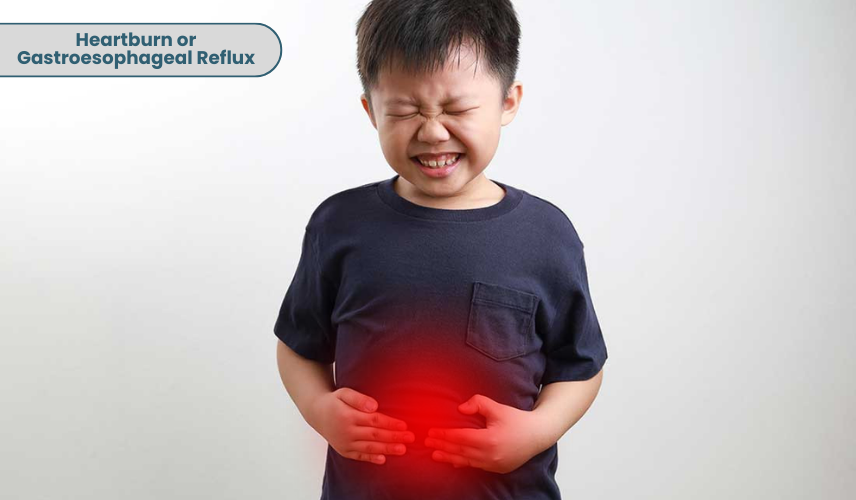
Heartburn or Gastroesophageal Reflux (GERD) in Children
What is gastroesophageal reflux?
Gastroesophageal Reflux (GER) occurs when stomach contents flow back into the esophagus (the tube connecting the mouth to the stomach). This backflow can irritate the lining of the esophagus and cause symptoms like heartburn, vomiting, irritability, or feeding difficulties, especially in infants and children.
When this reflux becomes frequent and leads to complications, it is termed Gastroesophageal Reflux Disease (GERD).
Common Symptoms in Children:
- Frequent spitting up or vomiting
- Persistent cough or wheezing
- Irritability during or after feeding
- Refusal to eat or difficulty swallowing
- Poor weight gain
- Heartburn (burning sensation in chest or throat) in older children
Causes of GERD in Children:
- Immature lower esophageal sphincter (in infants)
- Overfeeding or lying down right after feeding
- Obesity
- Certain food triggers (spicy, acidic foods)
- Delayed stomach emptying
- Neurological disorders in some cases
When to Seek Medical Advice?
While occasional reflux is common in infants and usually resolves on its own, persistent or severe symptoms should be evaluated by a pediatric specialist. Untreated GERD can lead to complications such as:
- Poor growth
- Esophagitis (inflammation of the esophagus)
- Breathing problems (aspiration, asthma-like symptoms)
- Feeding aversion
How is GERD Diagnosed?
Diagnosis is usually made based on clinical history and symptoms. In certain cases, additional tests may be recommended, including:
- pH probe monitoring
- Upper GI endoscopy
- Barium swallow X-ray
- Esophageal manometry
Treatment Options:
Treatment depends on the severity of symptoms and may include:
✅ Lifestyle and feeding changes:
- Smaller, more frequent feeds
- Keeping the child upright after feeding
- Avoiding known food triggers
✅ Medications:
- Acid reducers like H2 blockers or proton pump inhibitors (PPIs) may be prescribed if needed.
✅ Rarely, surgery (fundoplication) is considered for children with severe complications not responding to medical treatment.
Expert Pediatric Gastroenterology Care
At my clinic, I offer a child-centered and evidence-based approach to diagnosing and managing GERD. From newborns to adolescents, I ensure personalized care that helps improve your child’s digestive health and quality of life.
.png)